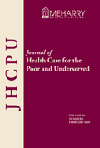Association of Clinicians for the Underserved (ACU) was front and center at a U.S. Senate hearing on the primary care workforce. The hearing, held by the Senate HELP Subcommittee on Primary Health and Aging [press release], “Addressing Primary Care Access and Workforce Challenges: Voices from the Field” focused on the primary care access crisis, doctor shortages and strategies to boost the number of providers around the country. Jim Hotz, MD, a member of ACU’s Board of Directors and founder of Albany Area Primary Health Care (AAPHC) in Albany, Georgia, was one of nine who testified before the panel. Hotz described to the Senate panel how the National Health Service Corps (NHSC) is the single most effective policy innovation this country has ever developed to address the primary care workforce challenge.
“The NHSC has been an invaluable ‘foot in the door’ for our primary care recruiting at AAPHC. The swamps of Southwest Georgia are not a natural attraction for the medical professional of today. But once clinicians join our group they receive deep professional satisfaction from the practice environment we provide,” he said. “Out of a total of 52 clinical providers currently employed by AAPHC, 24 have been recruited or retained using the NHSC. Currently we have 16 Physicians, two Dentists, five Physician Assistants and one Certified Nurse Midwife who were recruited or retained through the NHSC. The NHSC has led to 286 years of service with an average tenure of 24.2 years.”
Hotz also illustrated there is a challenge with job recruiting. “First and foremost is the overall shortage of primary care physicians being produced by the GME system of the United States,” Hotz said. “We are recruiting physicians who are experiencing a substantial increase in educational debt. Many are either selling out to the highest bidder, doing fellowships specializing in higher paying fields like cardiology or oncology that often pay three to four times what primary care does, or they are signing up with programs that offer significant loan relief programs.”
In addition to Dr. Hotz, the witness list included two other ACU members: Margaret Flinter APRN, PhD, of Community Health Center Inc. in Connecticut and Deborah Edberg MD from Erie Family Health Center. Dr. Flinter’s testimony focused on the Nurse Practitioner Residency program and Dr. Edberg’s testimony focused on the Teaching Health Center program. Both of these programs are critical to the future supply of primary care providers in the country.
Senator Bernie Sanders (I-VT), the panel’s chairman, said, “We are much weaker in terms of primary health care and we put much less resources into primary health care, comparatively speaking than to most other nations. Today in fact 60 million people in the United States nearly one in five people live in areas where there is a shortage of primary health care providers. This problem is clearly a national problem, but it is more so a rural problem…You are saving people’s lives. You are working in an area that gives hope to people in your community.”
The question now becomes “can medical students even afford to choose primary care?” Hotz said. The conclusion of a 2013 article in Academic Medicine was that “graduates pursuing primary care with higher debt levels need to consider additional strategies to support repayment.” In other words, they need the NHSC repayment program.
Following the hearing, Sanders introduced legislation to attract more doctors and other health care providers to primary care. The bill would boost funding for the National Health Service Corps by dramatically increasing opportunities for medical school graduates to go into family medicine.
 Follow
Follow






Follow Us!